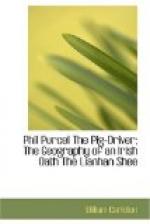There is a strange opinion to be found in Ireland upon the subject of curses. The peasantry think that a curse, no matter how uttered, will fall on something; but that it depends upon the person against whom it is directed, whether or not it will descend on him. A curse, we have heard them say, will rest for seven years in the air, ready to alight upon the head of the person who provoked the malediction. It hovers over him, like a kite over its prey, watching the moment when he may be abandoned by his guardian angel: if this occurs, it shoots with the rapidity of a meteor on his head, and clings to him in the shape of illness, temptation, or some other calamity.
They think, however, that the blessing of one person may cancel the curse of another; but this opinion does not affect the theory we have just mentioned. When a man experiences an unpleasant accident, they will say, “He has had some poor body’s curse;” and, on the contrary, when he narrowly escapes it, they say, “He has had some poor body’s blessing.”
There is no country in which the phrases of good-will and affection are so strong as in Ireland. The Irish language actually flows with the milk and honey of love and friendship. Sweet and palatable is it to the other sex, and sweetly can Paddy, with his deluding ways, administer it to them from the top of his mellifluous tongue, as a dove feeds her young, or as a kind mother her babe, shaping with her own pretty mouth every morse of the delicate viands before it goes into that of the infant. In this manner does Paddy, seated behind a ditch, of a bright Sunday, when he ought to be at Mass, feed up some innocent girl, not with “false music,” but with sweet words; for nothing more musical or melting than his brogue ever dissolved a female heart. Indeed, it is of the danger to be apprehended from the melody of his voice, that the admirable and appropriate proverb speaks; for when he addresses his sweetheart, under circumstances that justify suspicion, it is generally said—“Paddy’s feedin’ her up wid false music.”
What language has a phrase equal in beauty and tenderness to cushla machree—pulse of my heart? Can it be paralleled in the whole range of all that are, ever were, or ever will be spoken, for music, sweetness, and a knowledge of anatomy? If Paddy is unrivalled at swearing, he fairly throws the world behind him at the blarney. In professing friendship, and making love, give him but a taste of the native, and he is a walking honey-comb, that every woman who sees him wishes to have a lick at; and Heaven knows, that frequently, at all times, and in all places, does he get himself licked on their account.
Another expression of peculiar force is vick machree—or, son of my heart. This is not only elegant, but affectionate, beyond almost any other phrase except the foregoing. It is, in a sense, somewhat different from that in which the philosophical poet has used it, a beautiful comment upon the sentiment of “the child’s the father of the man,” uttered by the great, we might almost say, the glorious, Wordsworth.




